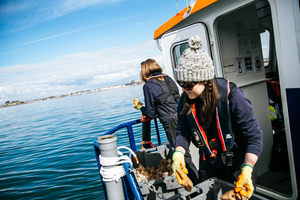England’s largest seagrass restoration continues in Plymouth Sound
Volunteers will pack 20,000 bags of seagrass seeds this month to help restore seagrass within the natural harbour.

20,000 bags of seagrass seeds will be planted underwater at Plymouth Sound . Credit: Ocean Conservation Trust
Research shows at least 44% of the UK’s seagrass has been lost since 19361.
This restoration work is part of England’s largest seagrass planting effort under the LIFE Recreation ReMEDIES partnership, led by Natural England.
The partnership’s restoration lead – Ocean Conservation Trust (OCT) – is carrying out 1 hectare of planting on 7 and 23 March, at Jennycliff Bay in Plymouth Sound. This will be in addition to the 1.5 hectares of seagrass planted there last year as part of the project.
It involves a huge contribution from volunteers, who will join the ReMEDIES partnership at the National Marine Aquarium (NMA) in Plymouth for 5 days of seed bag packing during March.
Fiona Crouch, Natural England Project Manager for ReMEDIES, said:
Restoring seagrass meadows means restoring the benefits they bring to people and nature – vital homes for wildlife, enhanced water quality, carbon storage, and so much more.
Disease, pollution, and physical disturbance has all contributed to the loss of seagrass. But seagrass is an important habitat, providing homes for sea life including juvenile fish and protected creatures like seahorses and stalked jellyfish. Seagrass also helps stabilise the seabed, reduce coastal erosion, clean surrounding water, and can be as effective at absorbing and storing carbon as our woodlands.
Mark Parry, Development Officer at the Ocean Conservation Trust, said:
After the success of our previous planting effort, we are excited to be getting underway again.
These events take a lot of hard work, planning and preparation, and wouldn’t be successful without the help of our community.
We are so proud of how many volunteers are willing to dedicate their time to help restore such an important habitat, within what is going to be the UK’s first ever National Marine Park.
The 4-year ReMEDIES project (July 2019 to October 2023) aims to plant a total of 8 hectares of seagrass meadows - 4 hectares in Plymouth Sound and 4 hectares in the Solent Maritime Special Area of Conservation. In mid-March, planting will begin at the Solent restoration site west of the mouth of the Beaulieu River, adjacent to the North Solent National Nature Reserve shoreline.
Find out more about LIFE Recreation ReMEDIES by following on Twitter, Instagram, and Facebook @EULIFERemedies, or visiting www.saveourseabed.co.uk.
Notes to editors
1 Research by Alix Green, published in Frontiers in Plant Science journal, March 2021 https://www.frontiersin.org/articles/10.3389/fpls.2021.629962/full)
LIFE Recreation ReMEDIES
LIFE Recreation ReMEDIES is a £2.5 million, 4-year marine conservation project to Save Our Seabed at 5 Special Areas of Conservation along England’s South Coast, through seagrass restoration, education and innovation. It is funded by the LIFE programme and led by Natural England in partnership with Marine Conservation Society, Ocean Conservation Trust, Plymouth City Council/Tamar Estuaries Consultative Forum and Royal Yachting Association. Visit saveourseabed.co.uk.
Natural England
Natural England is the government’s adviser for the natural environment in England, helping to protect England’s nature and landscapes for people to enjoy and for the services they provide www.gov.uk/government/organisations/natural-england.
Ocean Conservation Trust
The Ocean Conservation Trust is an ocean conservation charity that focuses on 2 key areas: habitat restoration and behaviour change. Following a conservation pathway that has been proven to work, the charity’s approach puts people at the centre, working hard to create meaningful connections between people and the ocean as the first step to inspiring long-term behaviour change. This is done in tandem with more traditional conservation work surrounding the monitoring and restoration of crucial ocean habitats, with a particular focus on seagrasses www.oceanconservationtrust.org.
Royal Yachting Association (RYA)
The RYA is the national body for dinghy, yacht and motor cruising, all forms of sail racing, RIBs and sports boats, windsurfing and personal watercraft and a leading representative for inland waterways cruising www.rya.org.uk. The Green Blue is the joint environment programme created by British Marine and the RYA. It was set up to encourage everyone who enjoys getting out on the water or whose livelihood depends on it, to do so as sustainably as possible thegreenblue.org.uk.
Marine Conservation Society
The Marine Conservation Society is the UK’s leading charity for the protection of our seas, shores and wildlife www.mcsuk.org.
Plymouth City Council/Tamar Estuaries Consultative Forum
Plymouth City Council is a unitary authority and has hosted Tamar Estuaries Consultative Forum since it was first established in the early 1990s. It has a vision for Plymouth to be Britain’s Ocean City and one of Europe’s most vibrant waterfront cities which is sustainable and cares about the environment and is currently working towards creating Britain’s first National Marine Park www.plymouth.gov.uk.
The Tamar Estuaries Consultative Forum (TECF) is a collaborative partnership bringing together the key authorities responsible for the management of the tidal waters of Plymouth Sound and Estuaries European Marine Site. Under the chair of the Queen’s Harbour Master, members consist of 5 local authorities, 4 harbour authorities, Natural England, Environment Agency, Marine Management Organisation, Duchy of Cornwall and both Devon and Severn, and Cornwall Inshore Fisheries and Conservation Authorities.